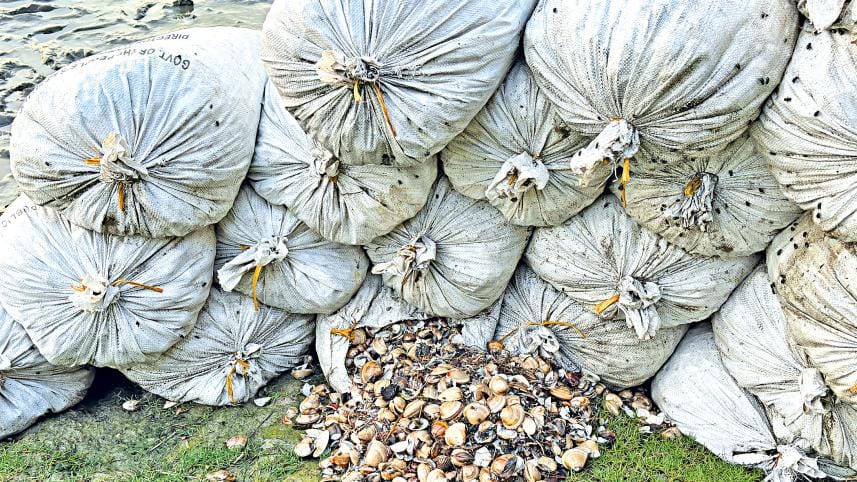The disappearing snails of Sundarbans

The bonojibis—forest-dependent communities who survive on the resources of the Sundarbans—are increasingly turning to the collection of snails and mud clams as traditional fishing grounds continue to shrink under successive conservation restrictions. Although the Forest Department has imposed a strict ban on harvesting these aquatic species, many bonojibis continue to do so discreetly, driven by the absence of viable alternative livelihoods.
Edible snails and mud clams (bivalve mollusc species) are abundantly found across the estuarine zones, alluvial forest terrain, and riverbeds of the south-western deltaic regions of Bangladesh. Despite their abundance, the bonojibis of the Sundarbans hardly collected them in earlier times. A few locals used to gather these species to produce lime from their hard shells or to make compost fertilisers.

However, since June 2025, fishers from the villages adjacent to the forest have begun collecting snails and mud clams rampantly. It signals that a new profession for survival is in its embryonic stage. Within just one and a half months, sometime around July, the prices of snails and mud clams increased significantly following the surge in demand. By the end of August and beginning of September, the bonojibis were selling their catch to agents at a rate of Tk 80 per kilogram. For the last few months—particularly from June to August—the forest-dependent people have largely relied on catching snails and mud clams for their daily subsistence.
There are multiple local agents in these regions already connected to the global supply networks of shrimp, soft-shelled crab, live eel fish, live crab, and chilled fish. Some of these agents have recently begun purchasing snails and mud clams from the Sundarbans region.
In mid-September, the Bangladesh Forest Department moved to stop the widespread collection of snails and mud clams in the Sundarbans after discovering that the practice—illegal under existing forest laws—was causing serious environmental damage.
Snails and mud clams play a crucial role in maintaining ecological balance, enabling collaborative survival and sustenance among the various species within the wetland ecosystem. Most importantly, they help to sustain the food cycle, which is essential to maintaining ecological stability.

Snails and mud clams also play a vital role in maintaining aquatic ecosystems by absorbing harmful substances from river and canal beds, thereby helping to purify water and keep aquatic habitats healthy. They are often called natural filters. These species also serve as a crucial food source for fish, crabs, shrimp, and other aquatic organisms, thus supporting the biodiversity of these environments. A significant number of wild animals ultimately rely on snails and clams for survival. The removal of these species threatens not only water quality but also the entire aquatic food chain and ecosystem. Protecting snails is therefore essential for preserving biodiversity and sustaining the livelihoods of communities dependent on the Sundarbans' aquatic resources.
Furthermore, snails and clams play a key role in stabilising alluvial mud, helping to protect coastal areas from erosion. Rampant and unregulated collection of these species can disturb the sediment layer, leading to increased riverbank erosion and long-term environmental degradation. Snail and clam collection often requires digging up riverbeds and alluvial mudflats, causing significant ecological damage. This practice disrupts natural habitats, destroys fish breeding grounds, and leads to a decline in crab and other aquatic populations.
According to Fazlul Hoque, Range Officer of Satkhira, Bonojibis began collecting snails and clams in large numbers due to shifting global food habits and rising international demand. These species have become delicacies in Singapore, Indonesia, China, Taiwan, and parts of Europe. Consequently, exporters have incentivised local communities to collect them. Although licensed to export live blood clams from the ocean, many exporters are reportedly sending mud clams instead.
However, these are not the only causes. Over the past two decades, fishing grounds in the Sundarbans' coastal regions have shrunk drastically due to various conservation laws and regulations. An elderly woman fisher from Munshiganj Union stated, "More than half of the forest is closed to us. Nobody can enter throughout the year. Bondo bada has permanently restricted us. Some influential people enter these areas by bribing local forest officials, but fishers like us are not allowed." The business that has thrived around these restricted areas is locally known as bondo-bada byabsa.

Another respondent from the coastal region lamented, "Earlier we never used to catch snails and clams. But since the forest is closed, what else can we eat if we do not collect them? They also fetch a good price."
For the Bonojibis of the Sundarbans, survival is becoming increasingly uncertain. More than half of the forest is now restricted for biodiversity conservation, and during certain periods, the entire forest is declared off-limits. Seasonal bans on fishing further tighten the noose, leaving marginalised fishers struggling to survive. With their traditional fishing grounds shrinking and no alternative livelihoods available, many have turned to collecting snails and mud clams, especially during the closed months of June and July. These landless Bonojibis, whose lives are inseparably linked with the forest's ecology, cannot simply be excluded in the name of conservation. Their forced disconnection undermines both their survival and the forest's balance. Once protectors of the ecosystem, they are now driven by desperation—an unintended consequence of rigid, top-down conservation policies that ignore the human side of sustainability.
Md Raihan Raju is a journalist at The Daily Star and can be contacted at raihanraju29@gmail.com
Send your articles for Slow Reads to slowreads@thedailystar.net. Check out our submission guidelines for details.




 For all latest news, follow The Daily Star's Google News channel.
For all latest news, follow The Daily Star's Google News channel.
Comments